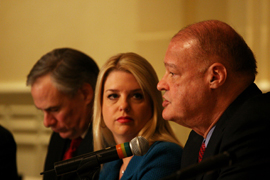Cronkite News has moved to a new home at cronkitenews.azpbs.org. Use this site to search archives from 2011 to May 2015. You can search the new site for current stories.
Justices won’t block ban on proof of citizenship for voter registration
WASHINGTON – The U.S. Supreme Court cleared the way Thursday for a lower court ruling that would stop Arizona election officials from rejecting voter registration forms that do not have evidence of citizenship.
Arizona has been requiring proof of citizenship with voter registration forms since 2005, shortly after voters passed Proposition 200. But the 9th U.S. Circuit Court of Appeals in April ruled that the proof-of-citizenship requirement conflicted with federal voter registration law.
The Supreme Court had stayed that decision earlier this month at the request of Arizona Attorney General Thomas Horne, who was planning a challenge to the lower court decision.
The justices Thursday, without comment, lifted that stay, clearing the way for the circuit court to issue an order banning the practice of requiring citizenship proof. That order is likely to come in the next week, said attorneys involved in the case.
Horne said he will go forward with his appeal to the Supreme Court. But the court begins its summer recess Friday, meaning the earliest the case could be considered is October when the justices return – if they agree to hear the case at all.
“We’re going to prepare a full petition for cert (a request for an appeal), and I believe we deserve to have it granted,” said Horne, adding that he planned to have the petition filed by the end of July.
Horne downplayed the fact that the Supreme Court refused to extend the stay until its October term, with only Justice Samuel Alito arguing for the stay to continue.
“That’s not a consideration of the merits of the case,” he said of the 8-1 decision.
But an attorney for the law’s opponents said it would be hard for the state to see good news in the high court’s decision.
“The 9th Circuit and now the Supreme Court has basically told them (state officials) you lose on this issue,” said Jon Greenbaum, a Georgetown University law professor and one of the attorneys arguing against Arizona.
“It’s hard for me to see, after the course of the decision today, the court actually granting a writ of certiorari in the case,” Greenbaum said.
Secretary of State Ken Bennett said in a prepared statement Thursday that he was disappointed by the Supreme Court’s decision.
“There isn’t a corner of this state where people are not concerned with voter fraud,” Bennett said. “Opposition to the simple act of providing proof that you are legally eligible to participate in our elections is hard to fathom.”
Greenbaum said the circuit court would likely issue an order within the next week mandating that the state begin accepting voter registration forms without evidence of citizenship. Under the federal voter registration form, applicants need only check a box attesting that they are citizens.
Voters will still have to show ID verifying their identity when they turn up at a polling place, a section of Proposition 200 that the circuit court upheld.
Horne said he did not think the circuit court’s order would create immediate problems, even with this being an election year.
“The problem is more of a long-term problem,” Horne said. “Right now almost everybody uses the state form. We can’t ask for identification on the federal form, but we can on the state form.”
When asked who decides which form to use, Horne said he thought the applicant could request either one.
But Greenbaum said that Arizona should not be applying the proof of citizenship any longer. He did not make a distinction between the federal or state forms.
“In a presidential election year it’s particularly significant,” Greenbaum said.







